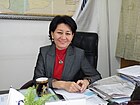Mongolian legislative election, 2012
|
|
|||||||||||||||||||||||||||||||||||||||||||||||||||||||||||||||||||||||
|---|---|---|---|---|---|---|---|---|---|---|---|---|---|---|---|---|---|---|---|---|---|---|---|---|---|---|---|---|---|---|---|---|---|---|---|---|---|---|---|---|---|---|---|---|---|---|---|---|---|---|---|---|---|---|---|---|---|---|---|---|---|---|---|---|---|---|---|---|---|---|---|
|
|||||||||||||||||||||||||||||||||||||||||||||||||||||||||||||||||||||||
|
|
|||||||||||||||||||||||||||||||||||||||||||||||||||||||||||||||||||||||
|
All 76 seats to the Ikh Khural 39 seats needed for a majority |
|||||||||||||||||||||||||||||||||||||||||||||||||||||||||||||||||||||||
|
|||||||||||||||||||||||||||||||||||||||||||||||||||||||||||||||||||||||
|
|||||||||||||||||||||||||||||||||||||||||||||||||||||||||||||||||||||||
Parliamentary elections were held in Mongolia on 28 June 2012 to elect 76 members of the State Great Khural. Also held during the parliamentary elections was the Ulaanbaatar city council election, the first time both have been held at the same time. For the first time, the election used vote counting machines by new parliamentary election law to make the election fair.
A new parliamentary election law introduced the status of domestic election observers who are nominated by civil society organisations. Parties had to announce 48 candidates for constituency seats and 28 candidates for proportional allocation. Among the changes was also a quota of 20% of seats reserved for women.
On 24 May the Democratic Party (DP) and Mongolian People's Party (MPP) announced their candidates for the election. A new party that participated was Mongolian People's Revolutionary Party which was established in 2010 by Nambaryn Enkhbayar.
Prior to January, the Democratic Party was a part of the grand coalition in government with the Mongolian People's Party, but later withdrew to focus on the campaign.
A large share of the posters were for individual candidates, though showing party logos, which were perceived as being aimed at voters in specific constituencies. By contrast, advertising on television was much broader and much more focused on the parties.
Corruption is a big problem, because of corruption, because of bad governance I think most of the emerging societies are failing and failed. We [don't] want to repeat that.
A spate of mining concessions to foreign companies has led to an influx of money into the country. This was also followed by accusations of corruption and a lack of accountability over the political leadership for squandering the country's natural resources and at least tacitly tolerating the mistreatment of Mongolian workers at mines operated by foreign companies. All political parties campaigned against corruption before the election. Mining and Energy Minister Dashdorjiin Zorigt said that "the only way out of this situation is to have more growth that is more just." According to the opinion polling firm, Sumati Luvsandendev, 90% of Mongolians believe that politicians benefit from some form of "special arrangements" over mining concessions to foreign companies. Rapper Tugsjargal Munkherdene, also known as "Gee," partook in campaigning against corruption. including a controversial video clip against the alleged exploitation by ethnic Chinese. As a result of public pressure, there was a speculation of tightening restrictions for investment in the mining sector after the election.
...
Wikipedia



